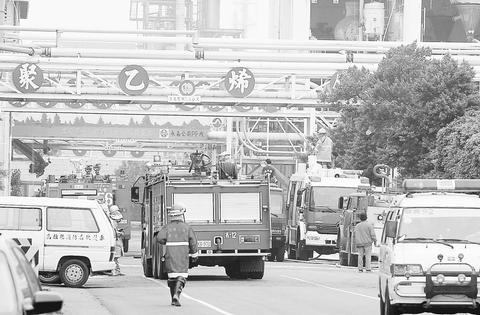Formosa Plastics Corp (
The plant, which produces plastic feedstock polyethylene, also known as high-density polyethylene (HDPE), exploded at 7:20am before catching fire, the company said in a statement to the Taiwan Stock Exchange.

PHOTO: CHANG CHUNG-YI, TAIPEI TIMES
The plant has an annual capacity of 180,000 tonnes, according to a company official.
The fire was extinguished at 10am yesterday and operations at the company's other plants in Linyuan aren't affected, Formosa Plastics said.
The plant will now undergo repair and safety inspections.
Formosa Plastics expects the plant to resume production in as early as a week, company spokesman Huang Tsung-chin said.
But local media reported that the plant may not be able to come online in a month, adding that Formosa Plastics would incur NT$5.5 million in losses each day if it ceased production.
Formosa, which has more than 20,000 tonnes of polyethylene in stock, said it doesn't expect the plant fire to affect supplies.
Polyethylene is the most popular plastic in the world. It is the polymer that makes grocery bags, shampoo bottles, children's toys and even bullet-proof vests.
Besides plants in Linyuan, Formosa Plastics also has another HDPE plant set up in the sixth napthacracker industrial park with a capacity of 200,000 tonnes, the company said.
Formosa shares fell NT$0.70, or 2 percent, to NT$33.6.
The stock has fallen 20 percent this year, compared with a 16 percent gain in the key TAIEX.

WAITING GAME: The US has so far only offered a ‘best rate tariff,’ which officials assume is about 15 percent, the same as Japan, a person familiar with the matter said Taiwan and the US have completed “technical consultations” regarding tariffs and a finalized rate is expected to be released soon, Executive Yuan spokeswoman Michelle Lee (李慧芝) told a news conference yesterday, as a 90-day pause on US President Donald Trump’s “reciprocal” tariffs is set to expire today. The two countries have reached a “certain degree of consensus” on issues such as tariffs, nontariff trade barriers, trade facilitation, supply chain resilience and economic security, Lee said. They also discussed opportunities for cooperation, investment and procurement, she said. A joint statement is still being negotiated and would be released once the US government has made

Authorities have detained three former Taiwan Semiconductor Manufacturing Co (TMSC, 台積電) employees on suspicion of compromising classified technology used in making 2-nanometer chips, the Taiwan High Prosecutors’ Office said yesterday. Prosecutors are holding a former TSMC engineer surnamed Chen (陳) and two recently sacked TSMC engineers, including one person surnamed Wu (吳) in detention with restricted communication, following an investigation launched on July 25, a statement said. The announcement came a day after Nikkei Asia reported on the technology theft in an exclusive story, saying TSMC had fired two workers for contravening data rules on advanced chipmaking technology. Two-nanometer wafers are the most

NEW GEAR: On top of the new Tien Kung IV air defense missiles, the military is expected to place orders for a new combat vehicle next year for delivery in 2028 Mass production of Tien Kung IV (Sky Bow IV) missiles is expected to start next year, with plans to order 122 pods, the Ministry of National Defense’s (MND) latest list of regulated military material showed. The document said that the armed forces would obtain 46 pods of the air defense missiles next year and 76 pods the year after that. The Tien Kung IV is designed to intercept cruise missiles and ballistic missiles to an altitude of 70km, compared with the 60km maximum altitude achieved by the Missile Segment Enhancement variant of PAC-3 systems. A defense source said yesterday that the number of

Taiwanese exports to the US are to be subject to a 20 percent tariff starting on Thursday next week, according to an executive order signed by US President Donald Trump yesterday. The 20 percent levy was the same as the tariffs imposed on Vietnam, Sri Lanka and Bangladesh by Trump. It was higher than the tariffs imposed on Japan, South Korea and the EU (15 percent), as well as those on the Philippines (19 percent). A Taiwan official with knowledge of the matter said it is a "phased" tariff rate, and negotiations would continue. "Once negotiations conclude, Taiwan will obtain a better